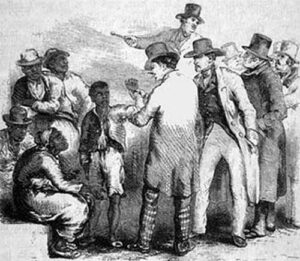
Pro-slavery Movement.
Richmond, Kansas in Nemaha County was settled in 1854 by Cyrus Dolman. It is an extinct town today. It was located on the Fort Leavenworth-Fort Kearny Military Road at the crossing of the South Fork of the Nemaha River.
Cyrus Dolman was a pro-slavery advocate, a member of the territorial legislature, and the first County Judge. An act to incorporate the Richmond Town Company was passed by the Bogus Legislature of 1855, which gave the corporation the power to purchase and hold, and enter by pre-emption or otherwise, any quantity of land where Richmond is located, not exceeding 1,000 acres. It also provided the company with the rights to lay the same off into lots, parks, streets, squares and avenues, and to sell, dispose of and convey the same. L. J. McGowen surveyed the plat of Richmond. By trading a $7 shotgun; be secured 160 acres. This he exchanged with William Berry for 160 acres, 80 of which became his farm.
Two buildings were at once erected by Lanham & Newton; one occupied as a dwelling, and the other as a store and hotel. A post office was established on July 11, 1855, with James Thompson as postmaster. Cyrus Dolman remained in the county for only a few years before moving further west.
Upon the organization of Nemaha County, in 1855, the legislature established the county seat at Richmond. The official business center for several years took place in the combined store and hotel building of A. G. Woodward.
Hot political topics included the slavery question and the selection of a permanent county seat.
In June 1858, an election was held in which the people should choose a location for the permanent county seat. By this time Seneca had been established and won after three elections had been held on the question. The other contenders were Wheatland and Richmond. The county seat was then moved to Seneca.
Because of its pro-slavery settler, the community lost favor when Kansas looked as if it would become a Free State. Richmond’s post office closed on July 12, 1859.

Sack of gold.
According to local legend, two buckskin bags full of gold nuggets were buried near the crossing in about 1854 by returning gold seekers. At this time, two miners who were returning to Boston, Massachusetts from the California gold fields had split from the wagon train they were traveling with because of the rowdy behavior of their fellow travelers. Reaching a ford in the Nemaha River, about two miles north of present-day Seneca, the miners made camp. Old survey plats or county maps should show this ford as it was a junction point where the Saint Joseph Trail met the Oregon Trail.
Needing supplies the miners decided to head into nearby Richmond. Before leaving, they buried the two buckskin bags in an empty powder can. While in Richmond one of the miners was shot and killed and the other barely escaped. Racing back to the wagon the surviving miner headed out towards St. Joseph, Missouri. In his haste to get away, he failed to dig up the gold nuggets. At St. Joseph, he sold his team and wagons and boarded a boat heading back east. Later he married and joined the Union forces when the Civil War began. Before leaving he gave his wife a rough map of where the gold was hidden and promised to travel back and recover the gold after the war ended. However, he died early in the war. In 1889, his two sons traveled to Seneca in an attempt to recover their father’s gold. However, time had changed the landmarks around the old camping grounds and the sons returned to Boston empty-handed.
Richmond was located about two miles north of Seneca
©Kathy Alexander/Legends of Kansas, June 2022.
Also See:
Extinct Towns of Nemaha County
Sources:
Blackmar, Frank W.; Kansas: A Cyclopedia of State History, Vol I; Standard Publishing Company, Chicago, IL 1912.
Bergman, Neil; Richmond, Nemaha County, Lost Kansas Communities
CNY Artifact Recovery
Cutler, William G; History of Kansas; A. T. Andreas, Chicago, IL, 1883.
